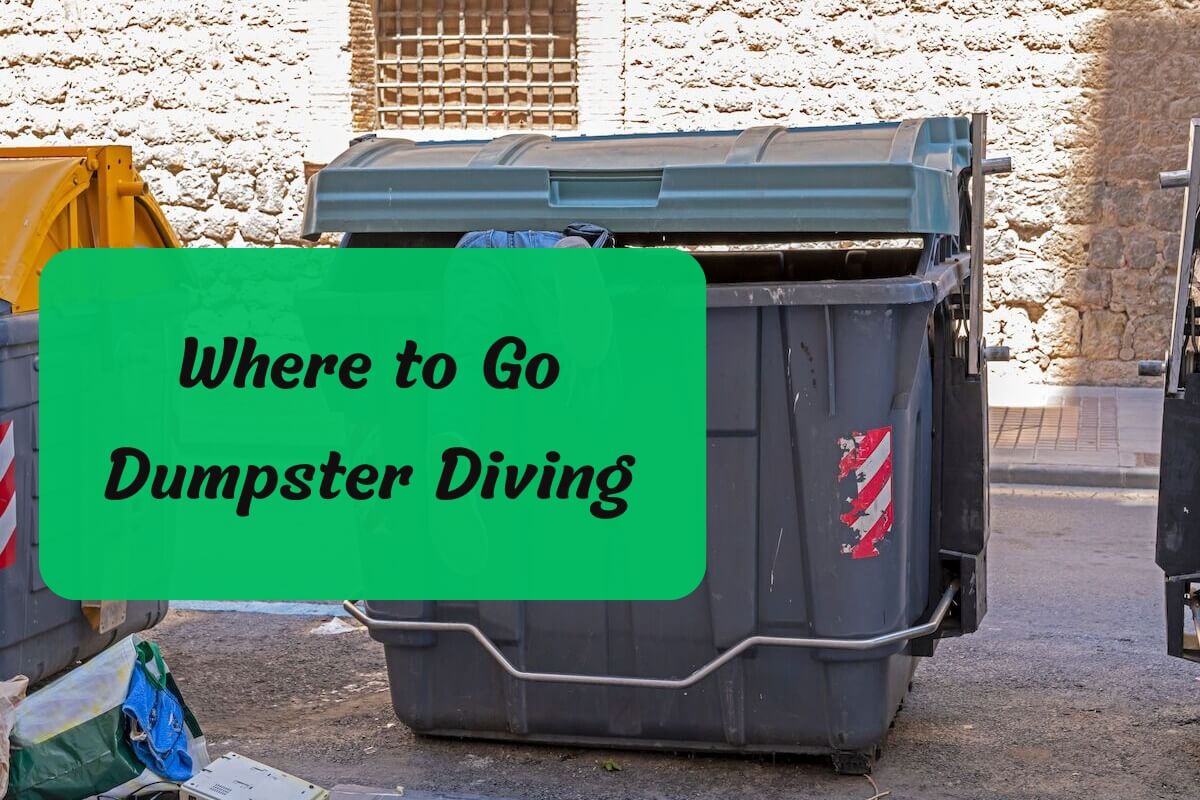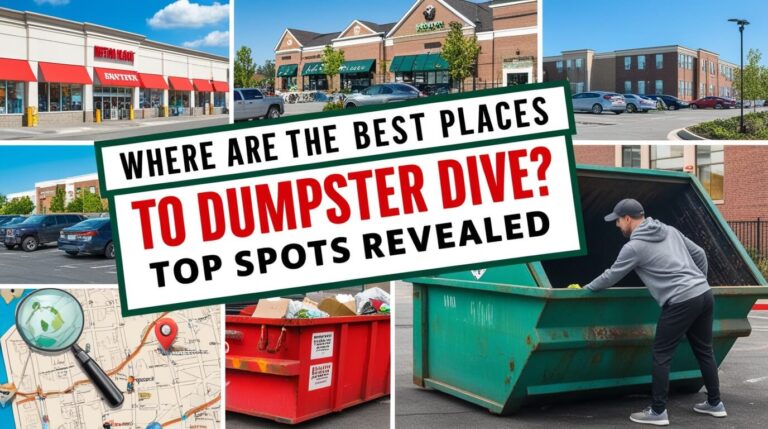
Are you seeking the best dumpster diving locations? This guide will reveal the top places to find valuable treasures while dumpster diving. We’ll explore different types of locations, legalities to consider, tips for successful dives, and how to find local hotspots.
Dumpster diving, the act of searching through discarded items in dumpsters or trash receptacles, has gained popularity among individuals seeking to reduce waste, find useful items, and even uncover hidden gems. While it may not appeal to everyone, those who engage in this unique activity often highlight its environmental benefits and the thrill of discovering unexpected treasures.
What is Dumpster Diving?
Dumpster diving refers to the practice of rummaging through dumpsters, trash bins, or other waste receptacles to salvage items that are still usable or valuable. It involves exploring discarded materials to find hidden treasures that could be repurposed, reused, or resold.
Why Dumpster Dive?
Environmental Benefits
One of the primary motivations for dumpster diving is its positive impact on the environment. By rescuing usable items from the waste stream, dumpster divers help reduce the amount of material that ends up in landfills, contributing to a more sustainable lifestyle.
Finding Free/Low-Cost Items
For many individuals, dumpster diving offers an opportunity to obtain necessities or unique items without spending money. From furniture and electronics to clothing and books, dumpster diving can be a source of free or low-cost goods.
The Thrill of the Hunt
Dumpster diving can be an exciting adventure, as you never know what you might find. The element of surprise and the satisfaction of uncovering hidden treasures make this activity thrilling for many enthusiasts.
Legal Considerations for Dumpster Diving
Location-Specific Laws and Regulations
Dumpster diving is legal in many places, but check local laws and regulations because some areas may have restrictions or prohibitions. Research and comply with local rules.
Respecting Private Property
Dumpster diving on private property without permission is often considered trespassing. It’s essential to respect “No Trespassing” signs and avoid diving on private property unless you have explicit permission from the owner or manager.
Best Places to Dumpster Dive
Grocery Stores
Grocery stores are a prime location for dumpster diving, as they regularly discard unsold or expired food items, as well as household products, personal care items, and even electronics. Timing is crucial, as dumpsters are typically filled after closing hours or during restocking periods.
Retail Stores
Retail stores often dispose of damaged or returned merchandise, as well as excess inventory or items with minor defects. From clothing and accessories to home goods and electronics, retail dumpsters can be a treasure trove for dumpster divers.
Electronics/Appliance Stores
Electronics and appliance stores may discard functioning or slightly damaged items due to store policies, warranties, or the inability to resell opened or used products. These dumpsters can be a goldmine for tech enthusiasts and bargain hunters.
Restaurants
Restaurant dumpsters may contain discarded food or kitchen items, but be cautious and follow food safety practices when searching through them.
Apartment Complexes
Apartment complexes can be excellent dumpster diving spots, especially during move-out periods or when tenants are discarding unwanted items. You may find furniture, electronics, kitchenware, and more.
College Campuses
At the end of each semester or academic year, college students often discard items they no longer need or cannot transport. College campus dumpsters can yield a wide variety of goods, from furniture and electronics to books and clothing.
Construction Sites
Construction sites frequently have dumpsters filled with discarded building materials, tools, or equipment. While some items may be damaged or unusable, you might also find valuable items that can be repurposed or resold.
Warehouses
Warehouses often receive and store a wide range of products, making them potential goldmines for dumpster divers. From electronics and appliances to furniture and clothing, warehouses can provide a diverse array of discarded items.
Offices
Office buildings may discard a variety of items, including furniture, electronics, office supplies, and more. As businesses upgrade or relocate, they may dispose of functioning equipment or gently used items.
Residential Areas
Residential neighborhoods can also be fruitful for dumpster diving, especially during spring cleaning or move-out seasons. You may find discarded furniture, appliances, clothing, books, and personal belongings that residents no longer need or want.
Tips for Successful Dumpster Diving
When to Go Dumpster Diving
Timing is crucial for successful dumpster diving. Often, the best times to dive are after business hours, on weekends, or during specific periods like move-out days or inventory clearances. Researching the schedules of your target locations can increase your chances of finding valuable items.
What to Take/Leave Behind
Dumpster diving can be exciting, but be selective. Only take useful or valuable items that you can realistically use or resell. Avoid taking hazardous, damaged, or potentially illegal items.
Safety Precautions
Dumpster diving can pose certain risks, so prioritizing safety is essential. Wear sturdy gloves and shoes, use proper lighting or flashlights, and be cautious of sharp objects or hazardous materials. Consider diving with a partner for added safety and assistance.
Dumpster Diving Etiquette
Respect the property and surroundings when dumpster diving. Leave the area as clean or cleaner than you found it, and avoid creating a mess or disturbing others. Additionally, be mindful of noise levels and respectful of any approaching individuals who may question your activities.
Finding Local Dumpster Diving Spots
Scouting Methods
One of the best ways to find local dumpster diving spots is through good old-fashioned scouting. Drive or walk around your neighborhood or nearby commercial areas, keeping an eye out for dumpsters or trash receptacles. Pay attention to the types of businesses or establishments in the area, as this can give you an idea of the potential items you may find.
Online Resources
Online communities and forums dedicated to dumpster diving can be valuable resources for finding local hotspots. Experienced divers often share their favorite locations, tips, and recommendations with fellow enthusiasts.
Networking with Other Divers
Connecting with other dumpster divers in your area can be extremely helpful. They may be willing to share their knowledge of local spots, as well as provide guidance and advice for newcomers to the activity.
Conclusion
Dumpster diving can be a rewarding and eco-friendly activity for those willing to explore the world of discarded treasures. By understanding the best places to dumpster dive, respecting local laws and etiquette, and practicing safe diving techniques, you can embark on an exciting adventure that reduces waste and uncovers valuable finds.
Remember, the locations mentioned in this guide are just a starting point. The key to successful dumpster diving is to keep an open mind, be resourceful, and continuously seek out new potential hotspots in your area. With patience and persistence, you may be surprised by the hidden gems waiting to be discovered in the most unexpected places.






